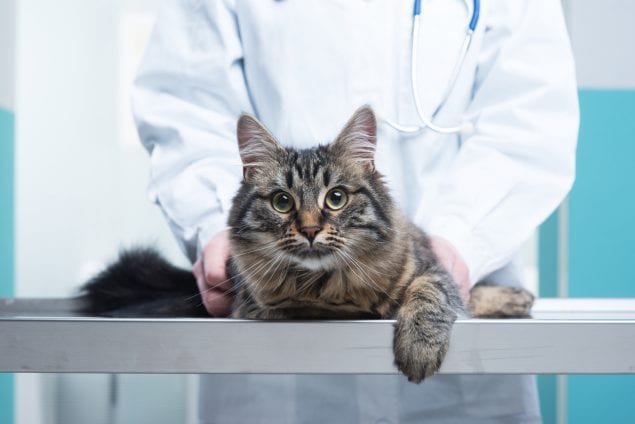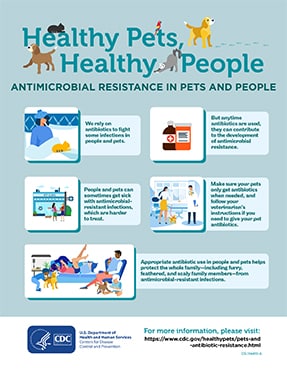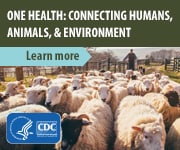Pets & Antimicrobial Resistance
Poster: Antimicrobial Resistance in Pets and People [PDF – 1 page]

Antibiotics save lives, but anytime they are used, they can lead to antimicrobial resistance. Antimicrobial resistance is when germs like bacteria and fungi develop the ability to defeat the drugs designed to kill them. It means the germs are not killed and continue to grow. Antimicrobial resistance can affect the health of both people and animals. Resistant germs can spread between people, animals, and the environment. Everyone can help improve antibiotic prescribing and use. This will help keep us healthy now, fight antimicrobial resistance, and ensure that these lifesaving antibiotics will be available for future generations.
How pet owners can help use antibiotics responsibly
- Ask your veterinarian:
- About preventing common infections with good hygiene, nutrition, vaccinations, and proper pet care.
- If tests have been done to make sure the right drug is chosen for your pet.
- Use antibiotics only when needed, and follow your veterinarian’s directions.
- Store antibiotics safely in your home, so that children and pets do not accidentally take medicine not meant for them.
- Dispose of antibiotics properly, do not flush them. Medicine take-back programs are a good way to safely dispose of most types of unneeded or expired drugs. Experts are working to better understand antimicrobial resistance in the environment (e.g., water, soil) and its possible impact on people.
- Talk with your veterinarian about using antibiotics responsibly to keep people and pets healthy.
What to know when your veterinarian diagnoses your pet with an infection, including antimicrobial-resistant infections
- Your veterinarian might need to perform additional tests to be sure the correct drug is chosen to treat your pet.
- Resistant infections may take longer to treat and can be more expensive.
- Talk to your veterinarian about preventing germs from spreading to other pets or people in your home.
Regularly wash your hands when handling, caring for, and cleaning up after animals or their supplies (food dishes, toys, beds) to help prevent germs from spreading to you and others.
Learn more about antibiotic use, antimicrobial resistance, and One Health, the connection between the health of people, animals, and the environment:
- Antimicrobial Resistance (CDC)
- Antimicrobial Resistance in Pets and People (Poster)
- Antimicrobial Use in Companion Animal Practice (American Veterinary Medical Association)
- Antimicrobial-resistant pathogens affecting animal health (American Veterinary Medical Association)
- Definition & Core Principles of Antimicrobial Stewardship in Veterinary Medicine (American Veterinary Medical Association)
- Antibiotic Resistance Threats in the United States, 2019
- Antibiotic Prescribing and Use in Human Medicine
- Antibiotic Resistance in Pets an Increasing Problem (Center for Infectious Disease Research and Policy)

